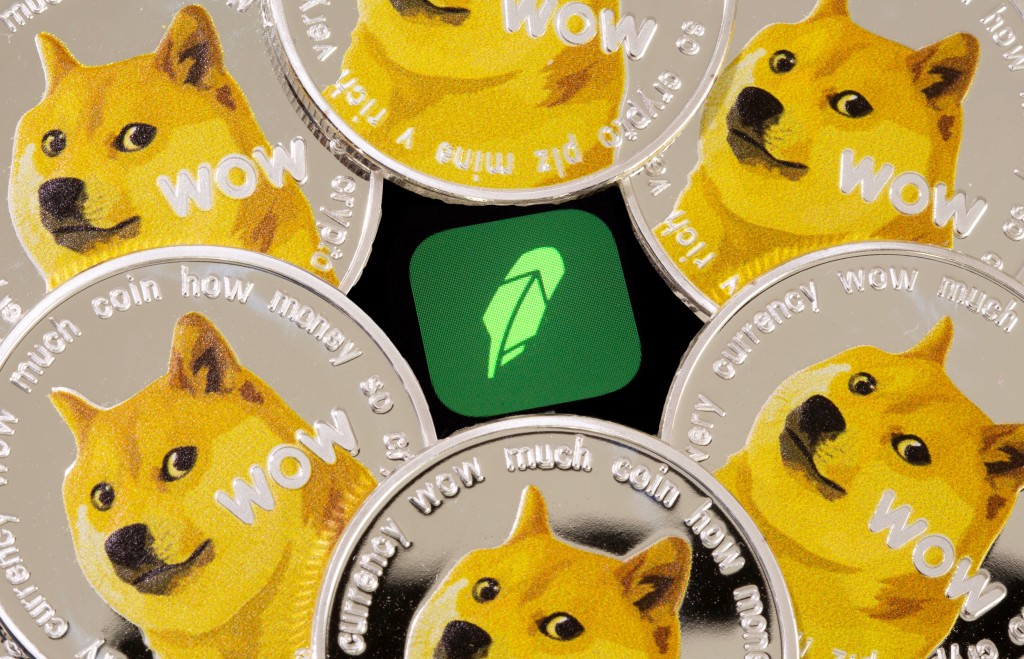The meme-inspired cryptocurrency Dogecoin, which got its start as a joke, accounted for a whopping 25.6 percent of commission-free trading app Robinhood’s revenue in the second quarter, giving the company a major boost in its first earnings report since going public last month.
In its second-quarter earnings report, the company said it made over $565 million in revenue for the quarter, more than doubling from a year ago, largely thanks to a surge in interest in cryptocurrencies.
The company makes the bulk of its money from transaction-based revenue and crypto trading has increasingly become an important revenue stream.
The company said Wednesday evening that crypto trades overall accounted for an eye-popping 52 percent of all transaction-based sales in the quarter, up from 17 percent in the previous quarter and a meager 4 percent in the fourth quarter of last year.
Of the company’s second-quarter transaction-based revenue of $451 million, Robinhood made $233 million from crypto alone, up from just $5 million a year ago, showing the explosion of interest in the sector over the past 12 months.
And a staggering 26 percent, or just over $144 million, of Robinhood’s crypto revenue in the latest quarter came solely from Dogecoin trades, the company said.
That means the company made more than twice as much on Dogecoin trades than it did on all of the stock-trading on the platform, which accounted for just $52 million, a decrease of 26 percent from a year earlier.

Robinhood added that over 60 percent of the company’s 22.5 million net cumulative funded accounts traded crypto in the quarter.
It was also “the first quarter where a larger share of new customers placed their first trade in crypto rather than equities,” Robinhood said.
When Robinhood filed to go public at the beginning of July, it revealed that Dogecoin accounted for 34 percent of its crypto transaction-based revenue in the first quarter, up from 4 percent in fourth quarter of last year.
The company offered an ominous warning at the time, telling potential investors that any slowdown in demand for Dogecoin could adversely affect its financial results.
“A substantial portion of the recent growth in our net revenues earned from cryptocurrency transactions is attributable to transactions in Dogecoin,” the company has since repeated as a risk warning in its filings with the Securities and Exchange Commission.
“If demand for transactions in Dogecoin declines and is not replaced by new demand for other cryptocurrencies available for trading on our platform, our business, financial condition and results of operations could be adversely affected,” it added.
Dogecoin reached a peak in early May of about 73 cents per coin as it was cheered on by notable supporters including Tesla CEO Elon Musk. But it started off as a prank in 2013 by a tech marketer who melded two popular Internet themes — cryptocurrency and a the Shiba Inu pup behind the so-called Doge meme — to make a Twitter joke.
“Investing in Dogecoin,” Jackson Palmer tweeted at the time, “pretty sure it’s the next big thing.”
The meme currency, which was then made real by software engineer Billy Markus, has more recently fallen from its recent highs to about 30 cents per coin, but is still up more than 8,000 percent from a year ago, according to data from Coinbase.
The company launched its crypto trading business, known as RHC, in 2018 and currently lets users trade seven different cryptocurrencies: Bitcoin, Bitcoin Cash, Bitcoin SV, Dogecoin, Ethereum, Ethereum Classic and Litecoin.
Shares of Robinhood were last seen trading almost 9 percent lower.






